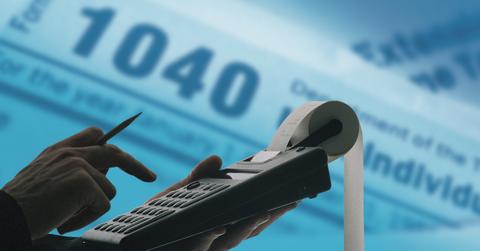How to Pay Your Deferred Self-Employment Tax
If you took advantage of the 2020 Social Security tax deferral, the due date for your first payment is Dec. 31. Here’s how to pay the deferred self-employment tax.
Dec. 17 2021, Published 11:53 a.m. ET

If you’re self-employed and you took advantage of the 2020 Social Security tax deferral, the due date for your first payment is Dec. 31. Here’s how to pay the deferred self-employment tax.
CARES Act allowed self-employed workers to defer taxes for two years.
When the COVID-19 pandemic hit the U.S. and businesses shut down and most Americans confined themselves at home, the government took action to help and passed the $2.2 trillion Coronavirus Aid, Relief, and Economic Security Act, otherwise known as the CARES Act.

Included in the CARES Act was a provision to allow self-employed workers to defer paying certain Social Security taxes for the 2020 tax year. Self-employed taxpayers could defer 50 percent of their income earned between March 27, 2020, and December 31, 2020.
Deferred taxes are paid in two installments.
The deferred payments would eventually have to be paid in two installments, with the first payment due on December 31, 2021, and the second payment due on December 31, 2022. Payments can be made any time on or before the due date.
The IRS has guidelines for paying your deferred taxes.
The IRS asks that you follow these guidelines in making your payment:
Pay through the Electronic Federal Tax Payment System or by using a credit or debit card, money order, or check.
Your deferred tax payments should be separate from other tax payments to ensure that they're applied to the deferred tax balance on the tax year 2020 Form 1040. IRS systems won't recognize the payment for deferred tax if it's with other tax payments or if it's paid with the current Form 1040.
Make sure to designate the payment as "deferred Social Security tax."
If you decide to make your payment through the Electronic Federal Tax Payment System, make sure to select “1040 US Individual Income Tax Returns” and “deferred Social Security tax” for the type of payment. You should also select “balance due” when asked for the reason for payment.
If you plan to pay your deferred taxes with a debit or credit card, you should select “installment agreement” and apply the payment to the 2020 tax year.
What if you can’t pay the full installment amount?
According to the IRS, if you can't pay the full deferred tax amount, you should at least pay what you can. Otherwise, you might be subject to penalty fees and interest charges.
Taxpayers who don’t pay the installment amount will get a balance due notice from the IRS that provides further instructions on making a payment or applying for a payment plan.
The IRS provides options for taxpayers who are facing financial hardship. If financial struggles make it hard for you to pay your deferred taxes, you can ask the IRS for a “temporary collection delay.” You will have to provide proof of your financial status. If approved, the collection of your tax debt will be delayed, but penalties and interest will accrue until you can pay the full amount. The IRS might also file a Notice of Federal Tax Lien against you.
